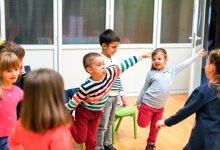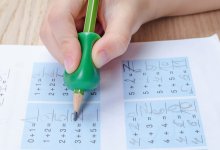Pre-K
Explore and share tips, strategies, and resources for helping students develop in prekindergarten and preschool.
Balancing Play-Based Learning With Literacy Mandates in Preschool
These strategies help teachers set up engaging and enriching opportunities for literacy exploration throughout the day.3.2kYour content has been saved!
Go to My Saved Content.Using Theater Games to Build Students’ Working Memory
By holding onto the information necessary to play certain games, students develop skills that lead to academic success.Your content has been saved!
Go to My Saved Content.Teaching Young Learners Self-Calming Skills
To help early elementary students manage big emotions, try breathing exercises and sharing how you deal with overpowering feelings.Your content has been saved!
Go to My Saved Content.Tips to Help Students With Their Handwriting
These simple tricks to improve motor skills can empower young learners to feel more in control of their handwriting.Your content has been saved!
Go to My Saved Content.Why Ages 2-7 Matter So Much for Brain Development
Rich experiences—from play to the arts and relationships—fundamentally shape a young child’s development.2.5MYour content has been saved!
Go to My Saved Content.Teach Kids When They’re Ready
A new book for parents on developing their kids’ sense of autonomy has some useful insights for teachers as well.2.1MYour content has been saved!
Go to My Saved Content.Learning to Name Feelings at the Emotional Ice Cream Shop
When pre-K students identify and act out emotions in an improv game, they develop essential self-regulation skills through play.67.6kYour content has been saved!
Go to My Saved Content.How to Teach Handwriting—and Why It Matters
Teaching young students how to write by hand before moving on to keyboarding can help improve their reading fluency as well.1.2MYour content has been saved!
Go to My Saved Content.Bringing a Dog to School
A veteran teacher and administrator makes the case for having a therapy dog in elementary school.1.2MYour content has been saved!
Go to My Saved Content.Time to Play: More State Laws Require Recess
Unstructured playtime is making a comeback in schools as frustrated teachers, parents, and advocacy groups demand legislative action.927.6kYour content has been saved!
Go to My Saved Content.What’s Lost When We Rush Kids Through Childhood
The author of "The Importance of Being Little" on the costs of our collective failure to see the world through the eyes of children.855.9kYour content has been saved!
Go to My Saved Content.Why Learning at Home Should Be More Self-Directed—and Less Structured
On March 18, 2020, Simone Kern tweeted that simply “recreating schools at home” passes up a golden opportunity to engage kids in authentic, self-directed learning.629.7kYour content has been saved!
Go to My Saved Content.Mo Willems on the Lost Art of Being Silly
The author of Don’t Let the Pigeon Drive The Bus! chats with us about creativity, drawing as empathy, and letting kids “do 51 percent of the work.”554.5kYour content has been saved!
Go to My Saved Content.Taking Your Read-Alouds From Interactive to Immersive
Story time is a highlight of the day for many young students, and teachers can boost engagement even further by adding costumes and sound effects.3.1kYour content has been saved!
Go to My Saved Content.A Game to Teach Preschoolers How to Use Classroom Materials
By playing a silly game that flips the script on who the expert is, early childhood educators can help students see how to use everyday classroom tools correctly.














